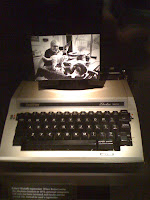I keep a folder of ideas for blog posts. One idea has been in there for months. One I've been meaning to get around to. A post about Eric Knight, the creator of Lassie, probably the most famous literary dog ever.
 |
| Eric Knight's classic story |
Knight would never know how influential his book would become or the movies and television series it would inspire.
As we know, it is now the archetypal loyal animal story, which paved the way for other famous tales such as The Snow Goose and War Horse. A classic, tear-jerking Hollywood movie starring Roddy McDowell and Elizabeth Taylor was made from Knight's novel, and while the author visited the set, he would never see the final film.
That's because Knight, a Major in the United States Army - Special Services, was killed in an air crash just as the Hollywood screen version of his novel was reaching movie theatres.
For some reason I decided to pull this particular idea out of the folder last night, with just these facts in my mind.
As I began my research I noted that Knight died in 1943. Ah, 70 years ago. That's a handy anniversary to hang the post on, I thought.
 |
| Eric Knight on set with the movie 'Lassie' in 1942 |
I looked at the date on my watch... January 14. And the day Knight died?
January 15.
A shiver went down my spine. So, whether you believe fate is at work, nevertheless I offer up my tribute to this brilliant and - in my view - underrated writer, on the 70th anniversary of his death.
Eric Oswald Mowbray Knight was born in Menston, Yorkshire, (a village notable also as the place where the Kaiser Chiefs met), on April 10, 1897.
Knight was young when his father died and his mother left England to become governess to Princess Xenia's children in Russia. By 1912, she had remarried and had moved to the United States. Eric followed her out there to finish his education. He eventually graduated from Cambridge Latin School, in Massachusetts.
The young Yorkshireman saw military service in the First World War before becoming a professional writer. He worked as a journalist, reviewing plays and movies for newspapers in Philadelphia.
Hollywood beckoned and he worked as a screenwriter for a couple of years, scripting movies at 20th Century Fox, while also finding time to publish five novels and short stories.
But by 1939, Knight and second wife, Jere, were living on a farm in Pennsylvania. The expatriated author found his mind wandering back to the land of his birth and in particular to the proud county of Yorkshire.
He sat down and began to write a quintessential English rural story about a collie, Lassie, partly inspired by his own dog, Toots, and filled with the bluff Yorkshire humour he knew from his childhood.
The story was initially published in the Saturday Evening Post, before being published in 1940 as a book.
Although, Eric Knight published other books - notably the humorous The Flying Yorkshireman which garnered comparisons with James Thurber and Thorne Smith - it was Lassie that brought him lasting fame. It's sold millions of copies and has been published in 24 countries.
 |
| The famous Hollywood movie |
Like many people who grew up in the 1970s, I watched the schmaltzy American TV series Lassie, which really bears little resemblance to Knight's book. The 1943 movie version, starring Roddy McDowell, is nearer to the spirit of the story and watching it as a child is one of my abiding memories of childhood.
It's only recently I got round to reading the book. The thing that impressed me most was Knight's straight ahead, unpretentious writing. He never lost the Yorkshireman's call-a-spade-a-spade directness and I think this is what gives Lassie its timelessness.
In essence, it's a simple but powerful story of love between a boy and his dog, told simply.
So, that is my tribute to Eric Knight. Please track down a copy of Lassie Come-Home and discover this late great author.
I'd also like to direct you to a wonderful website dedicated to Eric Knight at http://www.lassiecomehome.info, run by his granddaughter, Betsy Cowan.
Another interesting website is: http://www.chelsea-collies.com/knight.html packed full of information.
* I dedicate this blog post to the memory of my aunt, Jill Craddock (1936-2012), of Castlerock, Northern Ireland, who died over Christmas. Jill was a teacher who dedicated her life to young people and was a great encourager of my own reading and writing. This she continued with my own children, with the many books and audiobooks she sent them at Christmas over the years.









